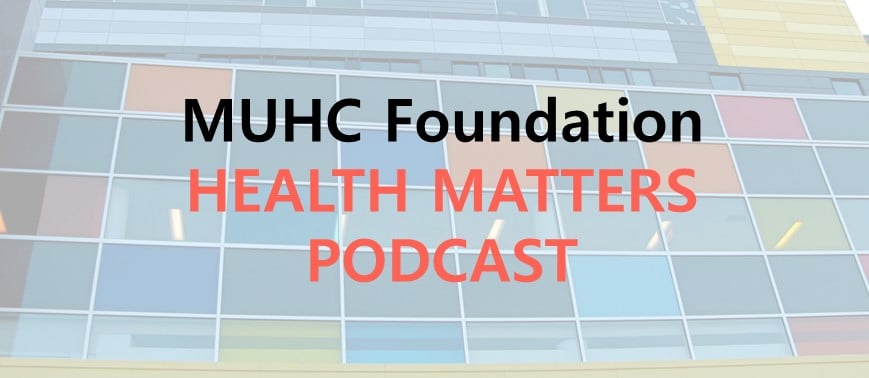Dr. Benjamin Smith shares how thinking big led him to try and reprogram the lungs to fight back against COPD. Dr. Deborah Assayag explains how patients help inform research into a group of diseases known as Interstitial Lung Disease.
(Time on podcast: 09:50). Dr. Ben Smith hopes to reprogram your lungs with a new study funded by the MUHC Foundation through the Trottier Webster Innovation Award. Dr. Smith, together with his team members Dr. Jun Ding and Dr. Larry Lands are using this funding to test a novel hypothesis. When designing their project, they considered the following: 1) What is a big problem in respiratory diseases and 2) What innovative technique could they apply to help solve this problem. In respiratory diseases, there are many chronic lung diseases, but one does stand out and that is chronic obstructive pulmonary disease (COPD). COPD is the 3rd leading cause of death worldwide and is associated with reduced quality of life, breathlessness, sputum production, and a lot of health services utilization. COPD tends to be a chronic problem and in some individuals, the disease can progress quickly. Unfortunately, no game changing treatment currently exists. To hopefully identify novel COPD treatments, the team turned to RNA technologies. There have been major advances in RNA therapeutics in recent years (think of COVID-19). This project will explore this technology in COPD. Cells in our lungs need to divide and maintain themselves over our lifespan. The current understanding for COPD is that those cells that help to maintain the lung have become “exhausted”. They cannot divide and regenerate the lung to the same extent that a normal lung can. The progenitor cells in the lung of COPD patients tend to be exhausted and this may lead to the recurring symptoms and infections these patients experience. This study will look at which genes are turned on or turned off in these healthy vs “exhausted ” COPD cells. Then the team will test if they can deliver RNA in an aerosol mist to try to reprogram these exhausted lung cells into a more youthful lung cell so that it could continue to maintain the lung.
(Time on podcast: 19:53). Dr. Deborah Assayag describes how she is helping patients with interstitial lung disease ILD) breathe easier. The Montreal Chest institute has a clinic specialized in ILDs. ILDs are a group of disease that affect the lung tissue and are associated with progressing inflammation and scarring of lung tissue. There are many things that can cause ILDs, such as exposures (asbestos, autoimmune diseases) or even genetic predisposition. It comes as no surprise that ILDs can significantly affect patients’ lives. They experience shortness of breath and suffer from chronic cough, which can limit their daily activities. As the disease progresses, they often have to go on oxygen therapy and their life expectance is shortened. ILDs are rare when compared to asthma and COPD, but the lack of effective treatment options makes this an important disease to study. The ILD clinic at the Montreal Chest Institute is gathering as much clinical information on its patients to really understand the natural history of the disease. With this information, the ILD clinic will be able to better understand risk factors that trigger or worsen the disease. There is also the risk that there are many patients that are not diagnosed or misdiagnosed – delays in diagnosis (between 1-3 years) can really impact patients’ lives. Dr. Assayag’s research program builds upon her clinical experience and allows her to identify the gaps in the field of ILDs and find innovative ways to address these gaps in knowledge.
Listen to the Podcast
Understanding the care in palliative care. The MUHC Foundation’s Health Matters. February 19, 2023.
Web: https://bit.ly/3CvxdMb
Spotify: https://spoti.fi/32HFxrc
Apple: https://apple.co/35NvItS
